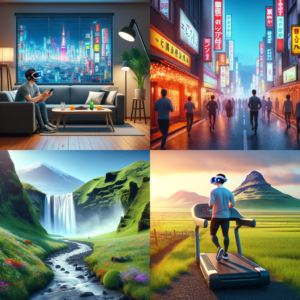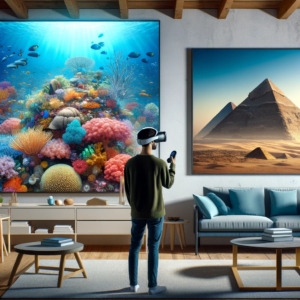The concept of travel has been revolutionized in the last few years, notably with the advent of Virtual Reality (VR) technology. VR getaways, a relatively new but rapidly growing sector, offer immersive experiences that transport users to exotic locations around the globe without leaving their homes. This transformative technology is not just reshaping how we experience travel but also how we perceive and interact with the world.
Table of Contents
ToggleThe Emergence of VR Travel
Virtual Reality, at its core, is a technology that simulates a user’s physical presence in a specific environment. It creates a computer-generated world, complete with sensory experiences, that can replicate real-world settings or conjure fantastical landscapes. The emergence of VR in the travel industry is a response to the growing demand for accessible, convenient, and eco-friendly travel options.

The Allure of Exotic VR Getaways
Exotic VR getaways are particularly appealing because they offer experiences that might be unattainable for many due to cost, physical limitations, or environmental concerns. Imagine wandering the bustling streets of Tokyo, exploring the serene landscapes of Iceland, or diving into the Great Barrier Reef—all from the comfort of your living room. VR travel provides a sensory-rich experience that is vivid and engaging.
The Technology Behind VR Travel
To create these immersive experiences, VR travel relies on a combination of high-quality 360-degree video, 3D modelling, and sometimes even haptic feedback systems that simulate touch. Advanced VR headsets, equipped with head-tracking technology, allow users to look around their virtual environment as if they were truly there. Some setups also include treadmills or stationary bikes to simulate movement, enhancing the feeling of exploration.
The Benefits of VR Getaways
- Accessibility: VR travel opens the world to those who may not be able to travel due to physical or financial constraints.
- Sustainability: It offers an eco-friendly alternative to traditional travel, reducing the carbon footprint associated with long-haul flights and tourism.
- Education and Preservation: VR can be used to educate people about different cultures and environments, and it can digitally preserve historical sites and natural wonders.
- Therapeutic Uses: It has potential therapeutic benefits, such as reducing stress or helping with the treatment of phobias.

The Experience of an Exotic VR Getaway
An exotic VR getaway begins with selecting a destination. The choices are vast and can range from real-world locations to fictional or historical settings. Once the destination is chosen, the user dons their VR headset and is instantly transported. The experience is not just visual; ambient sounds, and sometimes even scents, are integrated to deepen the immersion.
For instance, a VR trip to the Amazon rainforest would not only showcase the lush greenery and wildlife but also include the sounds of birds and the rustling of leaves. Some experiences even offer interactive elements, like virtual guides or the ability to manipulate objects in the virtual world.
The Challenges and Future of VR Travel
While promising, VR travel is not without challenges. The cost of VR technology can be a barrier for some users. There’s also the issue of VR-induced motion sickness, which affects a small but significant portion of users. Additionally, while VR can simulate many aspects of travel, it cannot fully replicate the physical and emotional experiences of actual travel.
Looking ahead, the future of VR travel is incredibly promising. Technology advancements will likely lead to more realistic and interactive experiences. We might see the integration of more advanced haptic feedback, allowing users to feel different textures or temperatures. The social aspect of travel can also be enhanced through multiplayer experiences, where people can explore virtual worlds together.
Conclusion
Exotic VR getaways represent a fascinating intersection of technology and travel. They offer an accessible, sustainable, and immersive way to explore the world. As the technology evolves, these virtual experiences will become more realistic and interactive, further blurring the lines between virtual and physical travel. In a world where digital technology is increasingly shaping our experiences, VR travel stands out as a testament to human innovation and the endless quest for exploration and understanding.
